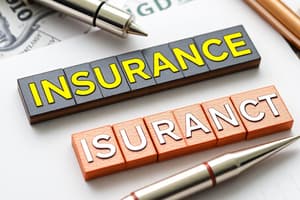Podcast
Questions and Answers
What fundamental principle ensures that an insured party does not make a profit from an insurance claim?
What fundamental principle ensures that an insured party does not make a profit from an insurance claim?
- Premium Payment
- Insurable Interest
- Indemnity (correct)
- Risk Transfer
A cargo ship encounters a severe storm, and some cargo is jettisoned to save the vessel. Which marine insurance concept applies to sharing the loss?
A cargo ship encounters a severe storm, and some cargo is jettisoned to save the vessel. Which marine insurance concept applies to sharing the loss?
- General Average (correct)
- Particular Average
- Sue and Labour Charges
- Constructive Total Loss
What is the purpose of 'Sue and Labour Charges' in a marine insurance policy?
What is the purpose of 'Sue and Labour Charges' in a marine insurance policy?
- To pay for expenses incurred to reduce a covered loss (correct)
- To cover routine maintenance costs of the vessel
- To provide additional profit to the insured
- To cover the cost of new equipment after damage
A shipowner takes out a marine insurance policy. What must the shipowner demonstrate to have a valid claim?
A shipowner takes out a marine insurance policy. What must the shipowner demonstrate to have a valid claim?
Which section of a marine insurance policy outlines the responsibilities the insured must fulfill to maintain coverage?
Which section of a marine insurance policy outlines the responsibilities the insured must fulfill to maintain coverage?
What factor would most likely lead to increased premiums for hull insurance?
What factor would most likely lead to increased premiums for hull insurance?
In the context of marine insurance, what does 'perils of the sea' generally refer to?
In the context of marine insurance, what does 'perils of the sea' generally refer to?
A vessel suffers damage, and the cost of repairs exceeds its value. What type of loss is this considered?
A vessel suffers damage, and the cost of repairs exceeds its value. What type of loss is this considered?
Which type of marine insurance protects against the loss of potential earnings from a voyage?
Which type of marine insurance protects against the loss of potential earnings from a voyage?
What is the first step in the claims process for marine insurance?
What is the first step in the claims process for marine insurance?
Why is marine insurance seen as vital for facilitating global trade?
Why is marine insurance seen as vital for facilitating global trade?
Besides covering physical damage, what else does marine liability insurance cover?
Besides covering physical damage, what else does marine liability insurance cover?
Which of the following would demonstrate insurable interest for a lender in a marine insurance context?
Which of the following would demonstrate insurable interest for a lender in a marine insurance context?
What information is typically found in the 'Declaration' section of a marine insurance policy?
What information is typically found in the 'Declaration' section of a marine insurance policy?
Which of the following factors does NOT directly influence the premium for marine cargo insurance?
Which of the following factors does NOT directly influence the premium for marine cargo insurance?
Under what circumstances might marine insurance be legally required?
Under what circumstances might marine insurance be legally required?
Which of the following is NOT typically an exclusion in a marine insurance policy?
Which of the following is NOT typically an exclusion in a marine insurance policy?
What role does an independent surveyor play in the marine insurance claims process?
What role does an independent surveyor play in the marine insurance claims process?
What is the significance of 'warranties' within a marine insurance policy?
What is the significance of 'warranties' within a marine insurance policy?
What type of marine insurance covers physical damage to a ship?
What type of marine insurance covers physical damage to a ship?
Flashcards
Insurance
Insurance
A contract where an insurer indemnifies the insured against financial loss from an event.
Insurer
Insurer
The party agreeing to indemnify in an insurance contract.
Insured
Insured
The party who is indemnified in an insurance contract.
Premium
Premium
Signup and view all the flashcards
Insurable Interest
Insurable Interest
Signup and view all the flashcards
Risk
Risk
Signup and view all the flashcards
Indemnity
Indemnity
Signup and view all the flashcards
Marine Insurance
Marine Insurance
Signup and view all the flashcards
Hull Insurance
Hull Insurance
Signup and view all the flashcards
Cargo Insurance
Cargo Insurance
Signup and view all the flashcards
Freight Insurance
Freight Insurance
Signup and view all the flashcards
Liability Insurance
Liability Insurance
Signup and view all the flashcards
Perils of the Sea
Perils of the Sea
Signup and view all the flashcards
General Average
General Average
Signup and view all the flashcards
Particular Average
Particular Average
Signup and view all the flashcards
Constructive Total Loss
Constructive Total Loss
Signup and view all the flashcards
Actual Total Loss
Actual Total Loss
Signup and view all the flashcards
Sue and Labour Charges
Sue and Labour Charges
Signup and view all the flashcards
Declaration
Declaration
Signup and view all the flashcards
Notice of Loss
Notice of Loss
Signup and view all the flashcards
Study Notes
- Insurance is a contract (policy) whereby an insurer indemnifies someone (the insured) against financial loss from an event.
- An insurer makes the insured "whole" again after a covered loss.
- The basic elements of an insurance contract:
- The parties involved
- Premium
- Insurable interest
- Risk
- Indemnity
- Period of Insurance Coverage
Parties Involved
- Insurer (insurance company): the party agreeing to indemnify.
- Insured: the party who is indemnified.
- Beneficiary: the party who receives payment if the insured loss occurs (only applicable to life insurance).
Premium
- Payment from the insured to the insurer for assuming the defined risk.
- The premium size depends on the risk assumed by the insurer.
Insurable Interest
- The insured must have a financial stake in the insurance's subject matter.
- Insurable interest means the insured would suffer a financial loss if the event (risk) occurs.
Risk
- The chance of financial loss occurring, like fire, accident, or death.
- Risk can also be the insurance's subject matter, like a building, ship, or life.
Indemnity
- To put the insured in the same financial position as before the loss occurred.
- The principle of indemnity ensures the insured does not profit from the insurance.
Period of Insurance Coverage
- The insurance policy is for a specified period and can be renewed afterward.
- The period gives certainty to the risk transferred and the resulting premiums.
Marine Insurance
- Provides cover against loss or damage to ships, cargo, terminals, and any transport by which goods are transferred, acquired, or held between points of origin and final destination.
- Goods include cargo, ships, and hulls.
- Marine insurance covers loss or damage to goods while in transit by sea, air, rail, and road.
- It protects individuals and businesses from financial losses associated with marine-related risks.
Types of Marine Insurance
- Hull Insurance: Covers physical damage to the vessel.
- Cargo Insurance: Covers loss or damage to goods while in transit.
- Freight Insurance: Protects against the loss of freight revenue.
- Liability Insurance: Covers liabilities to third parties, like damage to other vessels or pollution.
Key Concepts in Marine Insurance
- Perils of the Sea: Risks specifically related to marine voyages such as storms, collisions, and stranding.
- General Average: Losses from a voluntary sacrifice to save the vessel and cargo are shared proportionally by all parties involved.
- Particular Average: A partial loss suffered by a specific interest (either the ship or cargo) and borne by that interest alone.
- Constructive Total Loss: When the cost of repairing or recovering damaged property exceeds its value.
- Actual Total Loss: When the insured property is completely destroyed or irretrievably lost.
- Sue and Labour Charges: Expenses incurred by the insured to prevent or minimize a loss covered by the insurance policy.
Insurable Interest in Marine Insurance
- The assured must have an insurable interest in the subject-matter insured at the time of the casualty, though he need not be interested when the insurance is affected.
- Insurable interest arises when a person has a legal or equitable relation to the property at risk and may suffer loss by its damage or destruction.
- Examples of insurable interest:
- The shipowner has an insurable interest in the ship
- The cargo owner in the cargo
- A lender in a ship secures his loan.
Marine Insurance Policy Structure
- Declaration: Details about the insured, subject matter, voyage, and policy period.
- Coverages: Specifies the risks covered by the policy, such as perils of the sea, fire, and theft.
- Exclusions: Lists risks not covered by the policy, such as war, strikes, and inherent vice.
- Conditions: Outlines the duties and obligations of the insured, such as notifying the insurer of a loss and taking steps to minimize damages.
- Warranties: Promises made by the insured that certain conditions will be met, namely that the vessel being seaworthy.
Factors Affecting Marine Insurance Premiums
- Type and age of the vessel (for hull insurance); older vessels or those with a history of claims usually attract higher premiums.
- Type of cargo: Due to increased risk of damage or theft, hazardous or high-value goods typically increase premium costs.
- Voyage details: Longer voyages through hazardous waters can result in higher premiums.
- Coverage scope: Increased premium costs come from broader coverage with fewer exclusions.
- Deductibles: Higher deductibles typically lower premium costs and vice versa.
- Claims history: A history of frequent or significant claims can increase future premiums.
Claims Process in Marine Insurance
- Notice of Loss: The insured must promptly notify the insurer of any loss or damage.
- Survey and Assessment: An independent surveyor assesses the damage extent to determine the cause and repair cost.
- Documentation: The insured must provide all necessary documentation, such as the policy, bill of lading, and survey report.
- Settlement: Once the claim is approved, the insurer pays the insured the agreed-upon amount, subject to any deductibles or policy limits.
Importance of Marine Insurance
- Financial Protection: Protects businesses and individuals from potentially devastating financial losses due to marine-related incidents.
- Facilitation of Trade: Enables global trade by providing security and confidence to parties involved in goods transportation.
- Compliance: Lenders, charterers, and regulatory bodies often require it to ensure financial responsibility and risk management.
- Risk Management: Marine insurance serves as a critical tool for managing and mitigating risks associated with marine operations.
Studying That Suits You
Use AI to generate personalized quizzes and flashcards to suit your learning preferences.




